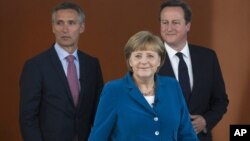LONDON -- German Chancellor Angela Merkel says Germany has the political will to ensure the stability of the eurozone. The German leader spoke alongside British Prime Minister David Cameron, who pressed for “urgent action” on the debt crisis.
Before bilateral talks with Britain’s David Cameron, German Chancellor Angela Merkel said it is important to emphasize the instruments to support the eurozone have been created.
She said Germany is prepared to work with those instruments whenever necessary to keep the eurozone stable, so that it can play its part towards global economic growth.
Part of the solution, she said, will be greater integration in Europe.
Merkel said the employment market should be integrated much more deeply and with more mobility.
International pressure is mounting for the eurozone to tackle its ongoing financial woes.
On Monday, the International Monetary Fund will be releasing a report on Spain’s banks. Depending on that report, Spain may be seeking a bailout from its euro neighbors to shore up its beleaguered banks.
Bailouts are a route that Greece, Portugal and Ireland have already gone down. Britain is not a member of the single-currency eurozone and Cameron emphasized his country will not be joining the eurozone and will not take part in growing integration. But he urged eurozone countries to deal with their issues.
"When it comes to the eurozone crisis, I am very clear that urgent action is needed to deal with the market uncertainty," he said. "That is about building fire walls and recapitalizing banks. But it is also essential, as Angela has said, that we need credible plans for getting on top of deficits and debt, and we also need those structural reform plans completing the single market to make sure we can get good growth throughout the European Union, including in the single currency area."
University of Kent Politics and International Relations Professor Richard Whitman says greater European integration is the road ahead, and that may leave Britain in a predicament.
"Really, perhaps the issue now is what happens to those states that are not eurozone members and are not going to be part of this super EU, and how they are going to relate to the group of countries in the eurozone, which are going to go further and faster when it comes to European integration," he said. "Will they sign up? Will they see themselves as wanting to join that club? Or will they be happy to see themselves on the periphery? And that is the dilemma for a country like the U.K."
Britain, he says, will remain on the periphery and that could be bad news for business.
"In other words, you operate in a market place, which is still the U.K.'s most important export market, but the rules of the game - how you trade, what the regulations are and so on - all that is set by others," he said. "And I think that will be the dilemma for countries that are on the outside and ultimately what makes it attractive to be in the core, in the heart of the European integration project."
A two-day European summit is scheduled later this month. Chancellor Merkel has played down hopes the meeting will provide a “big bang” solution to the euro crisis.




